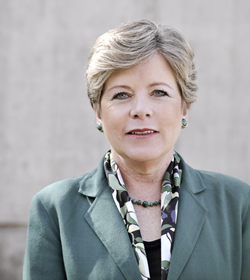"The State Must Play an Active Role in Order to Reduce Inequality"
Topic(s)
The United Nations official carried out an official visit to Peru, where she met with senior Government figures and took part in the UNASUR meeting.

(2 August 2012) According to the Executive Secretary of the Economic Commission for Latin America and the Caribbean (ECLAC), Alicia Bárcena, speaking in Peru: the State must play a more active role in reducing inequality using policies and social services with a rights-based approach.
The senior United Nations official was one of the main speakers at the Technical Meeting of High-level Officials and Experts on Social Policies and Human Development in follow-up to the UNASUR Declaration against Inequality: Towards an Agenda of Priority Social Actions, which is being held in Cusco and attended by authorities from many of the region's countries.
During her visit to Peru, Ms Bárcena also met with several country's senior Government officials. In Lima, she was received in the Torre Tagle palace by the Foreign Affairs Minister, Rafael Roncagliolo, the Finance and Economy Minister, Luis Miguel Castilla, the Deputy Minister of Policies and Social Evaluation, Juan Pablo Silva Macher, Superintendent of Banks, Insurance and Private Pension Funds, Daniel Schydlowsky, and other senior officials from the Foreign Affairs Ministry.
She also held a working meeting with the Minister of Development and Social Inclusion, Carolina Trivelli Ávila, and the two gave a joint press conference.
The meeting with Peruvian authorities included discussions of ECLAC's cooperation agenda with Peru for the next two years. The Peruvian authorities were keen to mention the similarities between the agenda of President Humala's Government and the ECLAC proposals in the publication Time for equality: closing gaps, opening trails.
The ECLAC Executive Secretary took the opportunity to present the Peruvian Foreign Affairs Minister with a copy of the new document that the Commission will launch at its Thirty-fourth Session entitled Structural Change for Equality: An Integrated Approach to Development, which will be presented at the meeting to be held from 27 to 31 August in El Salvador.
The Peruvian Foreign Affairs Minister thanked ECLAC for its support for many of the country's initiatives, including the Pacific Alliance, Forum for East Asia-Latin America Cooperation (FEALAC) and the activities scheduled during the country's Presidency of UNASUR.
At the UNASUR meeting held in Cusco, Ms Bárcena gave an address entitled "The role of the State in the quest for equality" in which she provided an overview of the current economic, political and social impact that the 2008 and 2011 crises have had on Latin America and the Caribbean, and put forward a series of proposals to make progress in reducing inequality.
She stated: "Why are we saying that now is the time for equality? Because the positive trend in the past decade leads us to believe that it is possible to achieve development with more equality and less poverty, with macroeconomic equilibrium, fiscal space, more diverse models of democracy, reduced social impact of crises, reductions in poverty and unemployment and better income distribution".
According to Ms Bárcena, the deepening of democracy and a greater level of development are reactivating the social role of the State and universal access to thresholds of well-being: "We need a more committed State and a fiscal covenant that increases its capacity to redistribute resources and play a more active role in promoting equality and productive convergence".
Ms Bárcena affirmed that the fiscal covenant includes social spending and the collection of resources for that spending (tax burden and structure). "In both areas there is significant room for progress, thereby strengthening the redistributive function of the State".
The ECLAC Executive Secretary said that "social equality and economic buoyancy should not be mutually exclusive", and she described some of the messages from the main document that the Commission will present at its forthcoming session.
She explained that it is possible to grow with equality, in other words with a macroeconomy that mitigates volatility, encourages productivity and promotes inclusion with production dynamics that close internal and external gaps. It was also possible to increase equality while growing, with capacity-building and reduction of vulnerabilities, labour inclusion, expanded internal markets, contributory and fiscal robustness and greater territorial convergence.
She declared that "the support of political and social stakeholders is essential if progress is to be made in terms of social covenants. This requires a cultural climate conducive to a redistributive coalition. The role of the middle classes is fundamental in building the fiscal covenant".
Any queries should be sent to the ECLAC Public Information and Web Services Section.
E-mail: prensa@cepal.org; Telephone: (56 2) 210 2040.
Follow us on: Twitter, Facebook, Flickr and YouTube.
Country(ies)
- Latin America and the Caribbean
Contact
Public Information Unit
- prensa@cepal.org
- (56 2) 2210 2040